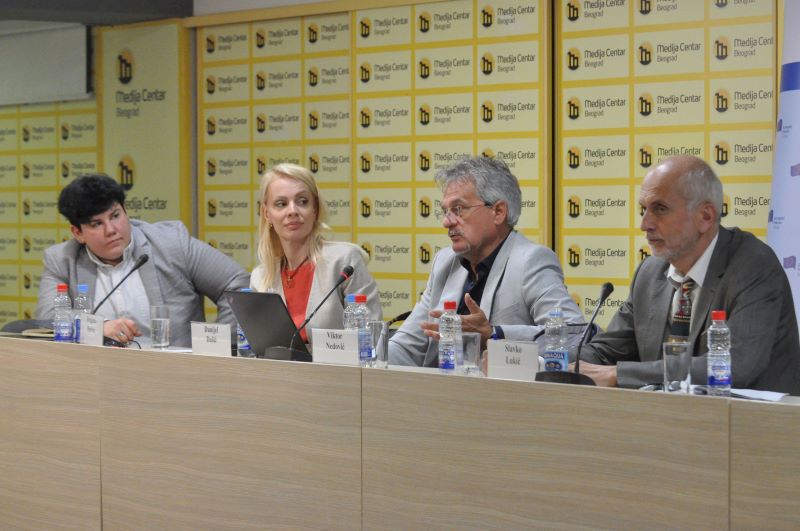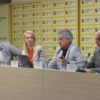The European Movement in Serbia organized a public discussion in the form of a round table titled “Achieving Balanced Regional Development through Smart Specialization” on May 21, 2024, at the Medija Centar in Belgrade.
Representatives of relevant institutions and organizations in the field of smart specialization and regional development were invited to participate in the round table, including Danijel Dašić, former director of the National Decentralization Coalition and director of the PraviLaw association, and Slavko Lukić, president of the Assembly of the Serbian Association of Regional Development Agencies and director of the Regional Development Agency Zlatibor.
Dragana Đurica, the Secretary-General of the European Movement in Serbia, moderated the panel discussion.
The round table served as the final event of the “Smart Regions of Serbia” project, implemented by the European Movement in Serbia with the support of the Belgrade Open School and the Swedish International Development Cooperation Agency, within the framework of the EUROPE ASAP program.
Đurica emphasized the dedication of the European Movement in Serbia to achieving balanced regional development, considering fair regional development as a prerequisite. She stated, “Economic decentralization and regional development play a crucial role in creating a balanced, inclusive, and shock-resistant economy, aiming to shift economic activities from large urban centers to local areas to reduce their burden and stimulate local economic activities leading to innovation, job creation, infrastructure development, ultimately reducing social tensions caused by various levels of uneven development.”
She noted that activities were conducted on various levels, including as part of the accession negotiations with the European Union in the context of Chapter 22, as well as from the perspective of economic decentralization and fairer regional development.
“We generally promote the idea of regional development, but what we advocate within regional development as one of the measures or ways to promote it is the concept of smart specialization. It is, in fact, the strategic diversification not only of economic but also other activities in areas where the region or local self-government unit is most competitive,” Đurica explained.
“The smart specialization strategy has been adopted for the period from 2020 to 2027. However, it is still not at the level of the European Union, in terms of regional classification into statistical units, and is not accompanied by the development of appropriate institutional frameworks to monitor and enhance it,” she added.
Đurica also highlighted the importance of developing a national strategy for regional development and the need for coordination between various stakeholders.
Zorana Milovanović, the project manager of the European Movement in Serbia, presented the document, highlighting the lack of awareness about smart specialization in the Šumadija and Western Serbia regions.
“In the document, we dealt with the genesis of regional development policy development, as we do not have a strategic framework. However, through the initial analysis of so-called ‘entrepreneurial discovery,’ or mapping where the potentials for innovation development in the economy are, we noticed that it was done very generally at the regional level in Serbia through the presentation of GDP, employment, and other segments,” Milovanović explained.
“We have also analyzed the European Commission’s Guidelines for developing a smart specialization strategy and noticed inputs suggesting that it is worth creating the strategy at the NUTS 2 level,” she added.
Regarding the situation in the Šumadija and Western Serbia region, Milovanović emphasized the need for better coordination and cooperation among local actors and institutions.
Slavko Lukić, representing the Serbian Association of Regional Development Agencies and the Regional Development Agency Zlatibor, emphasized the importance of institutional collaboration.
“Regional Development Agency Zlatibor has been operating for 22 years and works in the NUTS 2 territory in all sectors, while also working on institutional cooperation among the public, private, and civil sectors,” Lukić stated.
He emphasized the need for better coordination and communication at the national level, highlighting the role of regional development agencies as coordinators on the ground.
Danijel Dašić, from the PraviLaw association, focused on the lack of local capacities and the challenges faced by the civil sector in Serbia.
“The civil sector is very flexible and perhaps the only dynamic source of knowledge that can be applicable. We recognized the lack of capacities in the city of Niš in 2015 and proposed to develop six public policies based on which the city could create long-term development plans in areas such as social issues, environmental protection, communication with citizens, etc.,” Dašić explained.
He emphasized the need for a more enabling legal framework that allows people to develop their ideas and visions, with less interference from the state.
Overall, the discussion highlighted the importance of smart specialization and regional development strategies in achieving balanced and inclusive economic growth in Serbia, as well as the need for better coordination and cooperation among various stakeholders.










